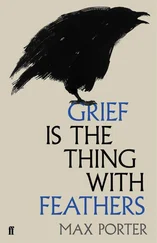Gob was silent for a moment, and then he said, “I don’t like clocks. It used to be my job to care for them, but since he died I’ve been, as you can see, on holiday. Onward and upward.”
He took Will out of the library, and they went down halls that were increasingly, in the upper levels of the house, littered with little pieces of machinery. Gears and struts and cranks and cylinders, they lay in the halls, or they were piled in the guest bedrooms and parlors. In one room, empty of furniture except for a magnificent bed whose mahogany posts were carved with laurel and acanthus leaves, Gob was reunited with a friend. “My aeolipile!” he said, speaking of a tall bronze globe, decorated with a figure of the wind — a gleeful face with pursed lips and puffed cheeks. It was obviously broken, cracked at the bottom and looking as if it were missing parts. “I made this when I was a child,” he said to Will, putting his arms around it and hugging it to him. “I haven’t seen it for years.”
Gob’s bedroom was on the fifth floor. “Lots of stairs,” Will said, “to climb every night.”
Gob shrugged. There were two doors off the hall at the top of the house. One was made of wood, the other iron. The iron door was open, rusted on its hinges so when Will stumbled against it it moaned horribly. He peered inside and saw the gray shapes of dead trees, lit up by weak moonlight falling through a dirty glass roof. “Not in there,” Gob said, pulling Will away and opening the wooden door. This was the neatest place in the house. There was a blue skylight in the ceiling, and a second iron door in the wall on the far side of the room.
“Don’t stand there,” Gob said. Will had stepped into a circle of stone, set incongruously in the wood floor.
“Sorry,” Will said, because a look of extreme displeasure had passed over his friend’s face. He walked out of the circle, and Gob smiled again.
“Now I will show you my house,” he said.
“I think you just did,” Will said, misunderstanding. Gob opened the second iron door in the far side of the room and they entered a place crowded with spirits and machinery. It looked like the pack-hole of some industrious squirrel, one that robbed factories instead of trees. There were gears of all sizes, great tangles of cable, stacks of lumber and steel plates, and underneath an ornate gaselier an assemblage that Will knew must be a machine of some sort, though he had never seen anything like it. Some spirits were caressing it, others milled happily about the room, gazing at pieces of matériel like fascinated gallery-goers.
“What is it?” Will asked, pointing to the machine.
“A combination,” Gob said, “of resistant bodies so arranged that by their means the mechanical forces of nature can be compelled to do work accompanied by certain determinate motions. It’s an engine. My house, you see, like your house.”
Will looked at it, his hands in fists at his sides. It seemed familiar and wonderful, and horrible, too, in the same way his glass house was horrible. “Are you compelled to build it?” Will asked. Gob grabbed him roughly by the shoulders, and Will thought he would eject him from the room, but instead he embraced him, crushing him with his little arms, crying happy tears again and saying, “Oh Will, oh my good friend, you understand me. You are a builder, too.”
There was another spirit, initially as furtive as the others were bold, and the only female. She flitted outside Will’s window, or she hid in the shadow of an alley at night, and he’d only catch a glimpse of her as he passed by. She was different because she was shy, and because she looked to be a complete angel. He’d groaned when he saw her. Somehow it was bearable to see a half angel. It did not bode the same ill for one’s mind or one’s equanimity. But she was entire. There was no missing her strange wings, her great height and fine green robes that looked to be hewn out of malachite, or the spots of green light that floated around her head like a crown of emeralds. She had strange wings and strange eyes. They were the darkest eyes Will had ever seen, flat and black as if someone had gouged them out and filled up the sockets with ink. Her wings were white and not made of feathers but tiny things like fingers or the beard of a cuttlefish.
One night he woke, not at the sound of the cannon, but because a cat was screaming on his roof. He lay with his eyes closed, thinking the animal might have become trapped in the glass house. When he opened his eyes the spirit was there, kneeling by his bed and leaning over him, so close he thought she might kiss him. She opened her mouth, and then she fled. Not a moment later, the little angel boy arrived, looking furious, stomping silently around the room. He turned to Will and shook his finger at him.
It was the last question Will would have asked, what the machine would do. He might not ever have known, if Gob hadn’t volunteered the answer. He had never known what the glass house would do — he’d just built it. He assumed that Gob, too, was building in ignorance of ultimate function. But Gob told him, standing in his workshop, the purpose he meant for his machine to accomplish, and it did not seem so terribly insane. Or it seemed properly insane, to build a machine to abolish death. Only the most reasonable of lunatics could devote his life to something so sensible and worthwhile, to put aside all other work and devote himself to this ultimate concern. “Will you help me, Will?” Gob had asked. “I mean to lick death, but I can’t do it alone. Will you help me win?” Jolly and Sam were standing on either side of Will, and their lips seemed to be moving in the same manner as Gob’s, asking the same question.
“What can I do?” Will had asked, because it seemed to him that he could do nothing. He confessed that he had built the glass house from blind, ignorant compulsion. He wasn’t an engineer or a mechanic. He did not understand steam power or aeolipiles or how steel was different from iron. But Jolly was jumping up and down, pointing to himself and at Sam, as if to suggest that they would help him.
Will waved his hand at all the parts and pieces around the room, at the machine under the gaselier. “I don’t understand any of this. I don’t know how to use such things, or how to make them.”
When Will said this, Gob only smiled wider. “I’ll teach you, my friend,” he said. “And then we’ll build together.”
“Sam,” Will said, “why don’t you come over here and sit with me?” Every so often he’d set two chairs by the big window over Fulton Street, sit down in one, and pat the other invitingly. “It’s nice on a cold day,” he said to his brother, “to sit in the sun and look out on the snow and the people bundled in their coats and think how you’re warm. Come and sit for a while. We’ll just be quiet together.” He patted again, gestured with both his hands, but Sam only stood on the far side of the room and eyed him warily. He shook his head as if to remind Will that he was a spirit, that he couldn’t feel such pleasures as warm sunlight, couldn’t touch the glass to marvel at how cold it was. Or else he shook his head just to say I will not sit with you, to say I do not know you, to say you are not any more my friend now than you were when I lived.
“I used to hate liquor,” said Will, taking a sip from the big flask of brandy he and Gob carried with them in the ambulance. On a cold spring day in 1868, Gob drove them hurriedly through a light snow to Number 344 East Thirty-second Street, where a lady had been shot by her deranged sister. Gob had finished his two terms of lectures. Those and his long apprenticeship with Dr. Oetker were enough to earn him his diploma from Bellevue. He might have become a house physician, but chose instead to enter the newly established ambulance service. Will, though he hadn’t yet earned his diploma, and wouldn’t until he’d completed another term, joined Gob in the ambulance, which had lamps placed on the sides and a reflector attached to the roof. The word “ambulance” was emblazoned on all sides, but this did not stop Gob from yelling at anyone who blocked their way, “Can’t you see this is an ambulance?”
Читать дальше












